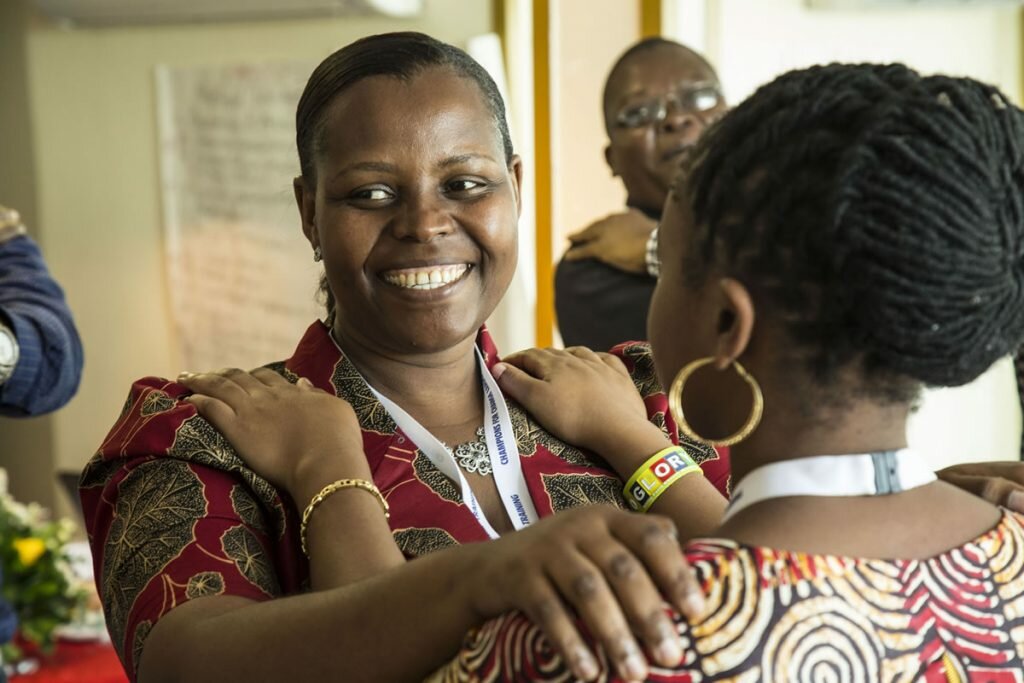Anthony Sangeda, one of the lead facilitators, exchanges with participants during Africa Lead’s TOT in Dar es Salaam, Tanzania. (Victor Oloo / Africa Lead)
Over the years, Africa Lead’s leadership training facilitators and “trainers” have played a central role in the program’s mission to scale up for food security across sub-Saharan Africa. In Tanzania and across East Africa, experienced facilitators with proven track records are in great demand. To meet this demand, Africa Lead is working to scale up the number of trained facilitators who can deliver capacity building training programs, and advance the skills of existing trainers.
In May 2016, in Dar es Salaam Tanzania, Africa Lead began trainings to ensure Africa Lead trainers would be a resource for years to come. The initial goal for the Tanzania Training of Trainers (TOT) course was to strengthen the cadre of Tanzanian based trainers with skills and abilities to facilitate Africa Lead II trainings. The long term goal is to increase the capacity of Tanzanian training professionals and build a network of qualified trainers available to institutions across sub-Saharan Africa, who can be a resource well beyond Africa Lead’s program period. The introductory course joined 13 newly recruited training professionals, 3 women and 10 men, to increase their skills and knowledge about agricultural policy and leadership in an intensive five-day training program. This training of trainers is an opportunity for me to improve my skills on training and facilitation.
“Although I am already a trainer I still need to learn, there is no limit to learning,” says Moses Ayubu, an Africa Lead Trainer from Tanzania. The major themes in the training comprised of experiential learning methodologies which included, Kolb’s model which explains learning by experience, information processing, generalization and application. Various skills on facilitating sessions for adult learners were brought on board. By using different facilitation skills, participants practiced the learning process through knowing how the learning climate can be set and a team built during adult learning sessions. Furthermore, participants were introduced to skills on how facilitation can be done by looking at how information can be communicated to the audience.
“We developed experiential learning designs which are adult focused, very interactive and the first training of trainers that we did, was developed in Washington and brought it to Africa and had African trainers “africanize” it,” said Kathy Alison, Africa Lead’s Senior Training Adviser and Deputy Technical Chief of Party. “Africans know what it is to live on this continent, and they know what the issues are and so if we can train people to get people involved and to be thinking from their hearts, as well as their heads, then we’ve done our job. Sessions on continental, national and district food and nutrition security initiatives were designed to help participants review their roles in food and nutrition security by describing how their work connects to Continental; Comprehensive Africa Agriculture Development Program (CAADP) and National food security initiatives; review the Malabo commitments and how they relate to their work; and a look into Tanzania’s 2014-2020 CAADP/TAFSIP strategic focus.

“As a trainer I hope to get the skills which will help me enable people to transform the agriculture sector in Tanzania and to enable them to have food security and reduce poverty in the country. When agriculture is improved it has the multiplier effect to the economy, It can produce the resources or raw materials for the industries in the country,” said Grace Aloise, a trainer from Tanzania.
In the year ahead, more Training of Trainers events will focus on increasing the capacity of existing trainers at the regional and continental level, with the aim of creating a public resource and pool of Africa Lead trainers that will be available to partner organizations and institutions, even well beyond 2018 when Africa Lead II concludes.